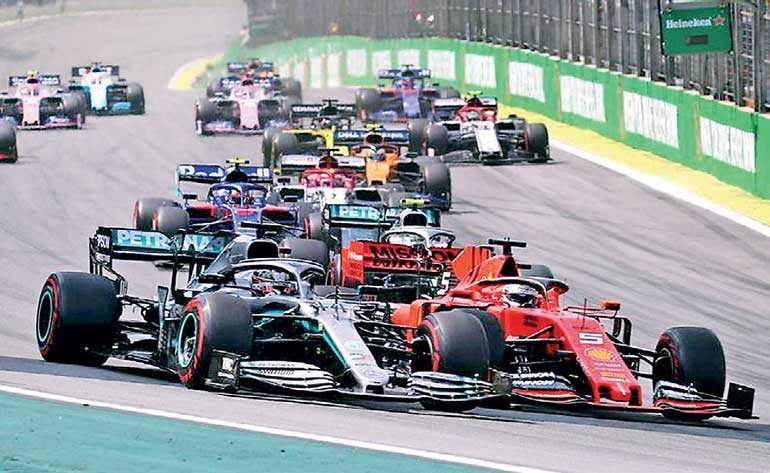Tuesday Feb 17, 2026
Tuesday Feb 17, 2026
Tuesday, 5 May 2020 00:00 - - {{hitsCtrl.values.hits}}

Ferrari’s Sebastial Vettel and Mercedes’ Lewis Hamilton in action at the start of the race, Formula One F1, Brazilian Grand Prix, Autodromo Jose Carlos Pace, Interlagos, Sao Paulo, Brazil, 17 November 2019 - Reuters
LONDON (Reuters): Formula One has agreed a $ 145 million budget cap for teams next year and will continue to try and tighten that for future seasons, Managing Director Ross Brawn said yesterday.
The Briton also told Sky Sports television after a teleconference with teams and the governing FIA that a much fairer prize fund would feature in a new commercial agreement due by the end of this year.
“The budget cap initial objectives were a more competitive field and I think with the situation we have now the sustainability, the economic sustainability, of Formula One is a priority,” said Brawn.
“That counts as much for the big teams as it does for the small teams.”
Formula One’s season has yet to start, with the first 10 races postponed or cancelled by the COVID-19 pandemic.
A major rewrite of the technical regulations has been delayed to 2022, with teams carrying over this year’s cars to 2021.
The budget cap had been set initially at $ 175 million but some teams had wanted a more drastic limit closer to $ 100 million to ensure the sport survives the crisis.
Ferrari, the oldest and most successful constructor, had opposed any reduction below $ 145 million.
The cap does not include drivers’ salaries, with Britain’s six times world champion Lewis Hamilton on an estimated $ 35 million a year at Mercedes. “The message is clear we’ve got to cut costs,” said Brawn.“We started at $ 175 (million), that was a long battle to get it there, and with the current crisis we are now going to start at 145 and the discussion really is how much further down we can drive the next few years.”
Brawn said the new-look cars would definitely be coming for 2022, despite some teams pushing for another year’s delay.
“Initiatives we are bringing with these new regulations are to make the sport more economically viable in terms of the complexity,” he said.
“The cars we have now are so complex that the more you spend, the quicker you will go. We need to level off that slope and create a situation where money is not the only criteria for how competitive you’ll be.”